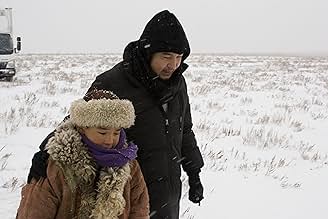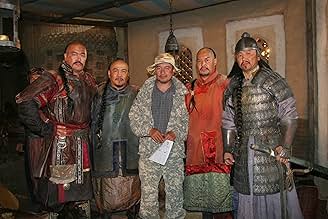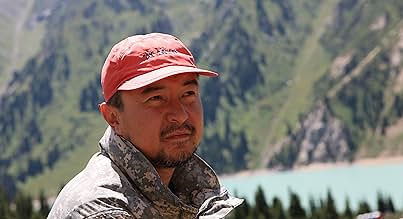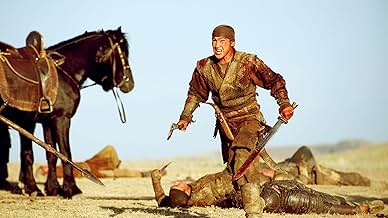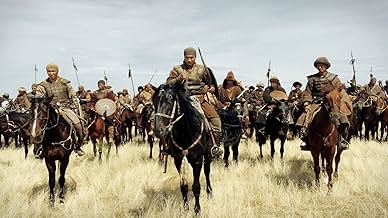A universal story about the freedom of the human spirit and the struggle against slavery and despotism, about love, loss and betrayal. It is seen through the eyes of simple Kazakh kids and t... Read allA universal story about the freedom of the human spirit and the struggle against slavery and despotism, about love, loss and betrayal. It is seen through the eyes of simple Kazakh kids and teenagers.A universal story about the freedom of the human spirit and the struggle against slavery and despotism, about love, loss and betrayal. It is seen through the eyes of simple Kazakh kids and teenagers.
- Director
- Writers
- Stars
- Awards
- 2 wins total
Ayan Utepbergen
- Taimas
- (as Ayan Utepburgen)
Toleubek Aralbaev
- Rakhimjan
- (as Toleubek Aralbai)
Tungyshpai Zhamankulov
- Yesset Batyr
- (as Tungyshpai Al-Tarazi)
- Director
- Writers
- All cast & crew
- Production, box office & more at IMDbPro
Featured reviews
this film was beautifully done in every way. good cast, good directing, good screenplay, good camera, good editing, beautiful locations and settings, good costumes and, very good music. i've never thought a movie out of a small central Asia country would be this good. the script was so well crafted that allowed the young heroes and heroines to freely perform with their hearts and spirits. this is a film that once you've watched it would always stay with you, the beautiful prairie, the remote snowy mountains, the horses, the galloping. the first viewer was right, this film is indeed much better than 'nomad', the fight scenes were especially good too.
Myn Bala the Kazakh movie Well, first movie I've ever seen on IMDb with only one review (three now, since I wrote this). It's the supposedly uplifting legend, based on a true story, of a set of young rebels early in eighteenth Century Kazakhstan who rose up against their oppressors. The country at that time was being overrun by a cruel and violent militaristic set of people called the Djongars, who were descendants of Genghis Khan and his Mongols. There are two main young male protagonists, Sertai and Taimas, who inevitably fall out as Sertai becomes more admired and takes over leadership; their kind-of-sister and lifelong friend Korlan, who is a scar-faced female warrior and very convincing she is too; and then Sertai falls for the beautiful young daughter, Zere, of a chief whom he offends, as being too conciliatory with their conquerors and not bold enough. The story is well told, though the flow is sometimes lost in translation. Mainly because the subtitles are out of synch, or use peculiar modern slang idioms, or during three long character farewell speeches leave just one (non-English) word up on screen for five minutes. Still, you get the gist. The story isn't new: Braveheart and all that - but this one has three things that make it standout (even apart from the fact that know nothing whatsoever about Kazakhstan's history so is always good to see a different part of the world through fresh eyes). The three things are:
The steppe. Every so often the main characters wander down from the hills where they're hiding and say something like: oh, our steppe is so beautiful, we must get rid of the invaders. They almost literally swoon over the beauty of the steppe. Really extraordinary: rarely have I seen a place which gives the western city-born person such a sense of otherness - great empty wild bare barren looking place - kind of makes me feel the opposite. The clothes. Presume they are all true to time for the place and period. Great fur hats cascading down backs, women's hats like pagodas, intricate tooled soft leather jerkins and belts, Tartar-ish military uniforms look rather like samurai - completely unlike anything have seen before. The horse-riding. Never seen anything like it in the movies: these people ride like they were born in the saddle. And why walk when you can trot? And why trot when you can gallop hell for leather across endless miles of steppe? So gallop they do. A lot. So very enjoyable. Only downside: the end. And being told that it was another three hundred years before Kazakhstan finally got its freedom. Which would be .... hm, sometime in the 1990s.
The steppe. Every so often the main characters wander down from the hills where they're hiding and say something like: oh, our steppe is so beautiful, we must get rid of the invaders. They almost literally swoon over the beauty of the steppe. Really extraordinary: rarely have I seen a place which gives the western city-born person such a sense of otherness - great empty wild bare barren looking place - kind of makes me feel the opposite. The clothes. Presume they are all true to time for the place and period. Great fur hats cascading down backs, women's hats like pagodas, intricate tooled soft leather jerkins and belts, Tartar-ish military uniforms look rather like samurai - completely unlike anything have seen before. The horse-riding. Never seen anything like it in the movies: these people ride like they were born in the saddle. And why walk when you can trot? And why trot when you can gallop hell for leather across endless miles of steppe? So gallop they do. A lot. So very enjoyable. Only downside: the end. And being told that it was another three hundred years before Kazakhstan finally got its freedom. Which would be .... hm, sometime in the 1990s.
Im kazakh.
Story in my personal opinion ia taled nicely, but not perfect. Actors are good, but not great. But when I reccolect tales of my granny, which were told by here granny, I undestand how hard was that time to live, and how brave were my ancestors. If you want to get invovlved in kazakh traditions and history, that film is very good as a point of a start.
P. S.
Film is to be watched in kazakh language to get it totally and in a right way. The thing is our language is a bit different from english, and hell lot stuff just theoretically can not be translated correctly to get all the info given in one ward. For example, in english you call horse as a horse, in kazakh language there are 47 different wards to say horse(describing its colour, manner of moving, age etc). And that is only about one word, and here we talk about a movie. As an interpreter who watched both english and original versions I would say that almost of 70% of meanings in key scence were lost!
Story in my personal opinion ia taled nicely, but not perfect. Actors are good, but not great. But when I reccolect tales of my granny, which were told by here granny, I undestand how hard was that time to live, and how brave were my ancestors. If you want to get invovlved in kazakh traditions and history, that film is very good as a point of a start.
P. S.
Film is to be watched in kazakh language to get it totally and in a right way. The thing is our language is a bit different from english, and hell lot stuff just theoretically can not be translated correctly to get all the info given in one ward. For example, in english you call horse as a horse, in kazakh language there are 47 different wards to say horse(describing its colour, manner of moving, age etc). And that is only about one word, and here we talk about a movie. As an interpreter who watched both english and original versions I would say that almost of 70% of meanings in key scence were lost!
It is a Kazakh war film set in Kazakhstan, one of the successor empires of the Mongol Empire, the most powerful country in the world.
The Mongol Empire, the most powerful country in the world during the Middle Ages, conquered the world. And Dzungar Khanate, one of the successor empires of the Mongol Empire, conquered Central Asia and began to recreate the glory of the Mongol Empire.
The Kazakh Khanate was a great empire founded in Kazakhstan, Central Asia, by 'Zanibek Khan, a descendant of Genghis Khan, the world conqueror of the Mongol Empire.' The Kazakh Khanate begins a fierce war with the 'Dzungar Khanate' for hegemony in Central Asia.
The Mongol Empire, the most powerful country in the world during the Middle Ages, conquered the world. And Dzungar Khanate, one of the successor empires of the Mongol Empire, conquered Central Asia and began to recreate the glory of the Mongol Empire.
The Kazakh Khanate was a great empire founded in Kazakhstan, Central Asia, by 'Zanibek Khan, a descendant of Genghis Khan, the world conqueror of the Mongol Empire.' The Kazakh Khanate begins a fierce war with the 'Dzungar Khanate' for hegemony in Central Asia.
I'm a sucker for nation-building mythos films, and this one totally fulfills this criteria. I have to admit that this was the first Kazakh language film I've ever watched. The costumery and landscapes were amazing (note to self, I must go hiking in Kazakhstan), but the plot was very transparent and the dialog equally stilted and predictable (This could also be due to the translation errors from Kazakh to English). The obvious love interest and tension between the families/clans/tribes with the expected resolution is also included. That said, I still really enjoyed it, as this historical epoch was unknown to me, and it was fun going down the rabbit hole researching the historical battles it depicted.
Did you know
- TriviaThe official submission of Kazakhstan to the Best Foreign Language Film of the 85th Academy Awards 2013.
Details
- Release date
- Countries of origin
- Languages
- Also known as
- Myn Bala, les guerriers de la steppe
- Filming locations
- Production companies
- See more company credits at IMDbPro
Box office
- Budget
- $12,000,000 (estimated)
- Gross worldwide
- $2,172
- Runtime
- 2h 12m(132 min)
- Color
Contribute to this page
Suggest an edit or add missing content


